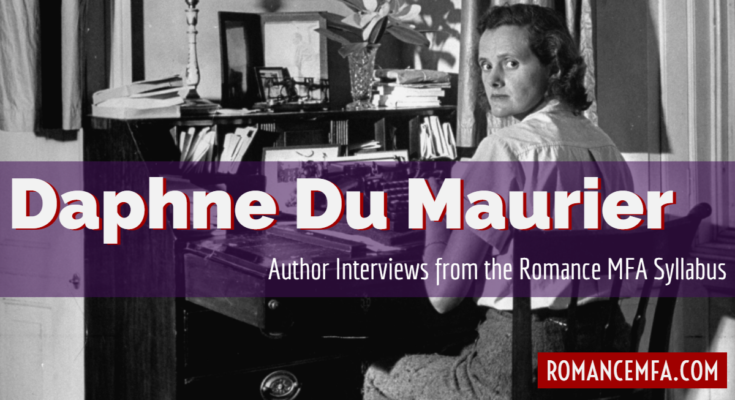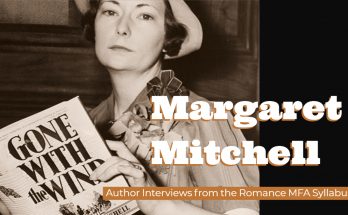This is part of an ongoing series to find interviews with authors whose books appear on the Romance MFA syllabus. Previous installments have featured E.M. Forster, E.M. Hull, and Margaret Mitchell. Today I’m looking for Daphne Du Maurier interviews. She’s on the syllabus for Rebecca, one of the not-quite romances I read in 2018.
Du Maurier interviews are a bit thin on the ground, however. She lived for 25 years at Menabilly, the isolated estate on the coast of Cornwall which she used as the setting for Manderley in Rebecca, and I get the impression that she didn’t mind the isolation one bit. Interviews with her three children are more plentiful than with Du Maurier herself. I did find some footage of Du Maurier and her children in 1944, but there’s not a word from the author in the clip.
Tantalizing but inaccessible from my US location, is a 1971 interview on the BBC. I assume that those in the UK whose taxes fund the BBC can watch it!
1977 Daphne Du Maurier Interview
I did find one Du Maurier interview, or at least clips interspersed with Cornish scenery or bits of the movies based on her books, from 1977 with Cliff Michelmore. You’ll have to click through to watch it, as embedding has been disabled, but it’s worth it to hear her voice, I think. I have, however, transcribed a few of the pieces I found interesting. For instance, the interviewer shows her the above footage and she is delighted.
CM: This is the only film in captivity of you.
DdM: Good Lord!
CM: You must be about 40.
DdM: [unintelligible] life at 40. Good heavens. That’s a very good suit, that. I remember that. Somebody, an admirer, used to call me Marlena Dietrich when I wore that. There we go, and we’re advancing across the lawn. That little chap is my son and the girl is Flave. I don’t know where Tessa is.
CM: Do you remember this film being taken?
DdM: No! Can’t remember a thing of it.
Regarding her writing, she made herself a private space on the grounds of Menabilly.
CM: You had a built that was buried in the garden.
DdM: Oh, the hut really was to be on my away from the telephone, anybody coming in the room, children shouting up asking things.
The interviewer also asks about the intertwining of finance and inspiration.
CM: Could a novelist make money in those days?
DdM: Well, bit by bit. I can’t remember how well The Loving Spirit sold, but obviously from that time on I began to get a little bit independent, you see, and so could do more or less [unintelligible] pay for myself, which was my main object always.
CM: Because you go on about this, the driving force is “I must make money,” you say.
DdM: Yes, yes, yes, I mean the driving for was I must write, get this story out of my system, but following closely upon that, I must be independent, [I] always wanted to be independent. Not from any antagonism to the family but simply so that they didn’t have to pay for my wishes, whims, or whatever.
They also discuss each of her books. Frenchman’s Creek, she says, is the only romance she ever wrote,
DdM: I am NOT a romantic novelist. The only–this I shall swear–the only romantic novel I’ve ever written, and I do admit it was rather romantic, (laughs) was Frenchman’s Creek. A woman falling in love with a pirate [unintelligible] Yes, alright, that’s romantic, but the others–not Jamaica Inn, no, or Rebecca, which is a study in jealousy.
and about Rebecca, she says,
DdM: That one is a favorite of every reader of my books. I never know quite why. I mean, I didn’t feel it was going to be frightfully game to sell or anything, and I never do when I was writing it. I thought of the idea, oh, I don’t know, pottering around Menabilly and looking there when one was trespassing in old days.
If you really want to get into Daphne Du Maurier’s thoughts on writing, however, I found a very interesting book that I haven’t had time to do more than skim so far. Letters from Menabilly: A Portrait of a Friendship is well-annotated correspondence from Du Maurier to younger author Oriel Malet. You can preview it on Google Books. Here’s a part of one of the letters, written in the early 1950s, in which Du Maurier address both “plot” and the tendency to write the same characters over and over.
Dearest Oriel,
Here we go again, it’s like Chesterfield or someone, of Madame de Staël! They ought to be read by students years hence! Listen, first of all, don’t get all hot and bothered about this thing you insist on calling ‘a plot’. You don’t have to have a ‘plot’; it sounds like Guy Fawkes in his old cloak, creeping with a lantern. You don’t even have to have action (think of Proust). But you must have a real reason for it all, a reason for the things you want to say. Not just send Jemima off to Paris without knowing what you are going to do with her, but hoping something will happen. That’s not professional, it’s amateur. Charades, in fact!
You can keep the Jemima girl and Arthur sitting on a chair and their thoughts banging away at each other right through th book if you like, but their thoughts must get you somewhere. And I still am for a beginning, a middle, and an end, but it doesn’t have to be a ‘plot’. (Infuriating, I keep seeing all these conspirators whispering in corners!) The thing is, you know, Jemima won’t die, and Niall* won’t either, and we shall be doomed in some way to drag them in until we are completely purged. You see, your Arthur book will have to be a bit Jemima-ish, because of you being Jemima-ish, and in love with Arthur; if you make her quite a different sort of girl, it won’t come right. On the other hand, it might be a good idea if we got away from ourselves completely with new books. I can’t drag Niall into Mary Anne, and you couldn’t drag Jemima into a Life of Lord Chesterfield! We would, though. Niall will creep in as a sort of young captain in the artillery, hanging about Mary Anne in her off moments when she’s bored with the Duke of York, and Jemima will be a dreamy sensitie young cousin of Lord Chesterfield, observing him. (Why Lord Chesterfield? Well, I don’t know. I mean, he does as a symbol!)Oh, to be purged, to be purged. Yes, the I in Rebecca was me, well purged. I’ve never been her since, but I think I will be on Wednesday when P.P. comes and I trip up, shaking hands.
I also found a notice from April 2019, about an auction of correspondence and photographs from the collection of Maureen Baker-Munton, who was a personal assistant to Du Maurier’s husband, Lieutenant-General Frederick “Boy” Browning. Among other things, Browning was at various times the comptroller of Princess Elizabeth’s household, and the treasurer for Prince Phillip–that’s the P.P. referenced in the above letter! The collection was divided in 354 different lots, which went for prices between £60 and £9,800. Not sure who they went to, but perhaps there might be another publication of Du Maurier letters on the horizon? Let’s cross our fingers.



